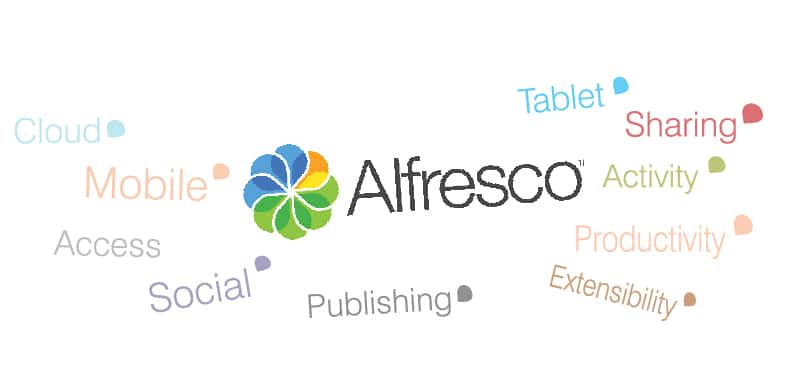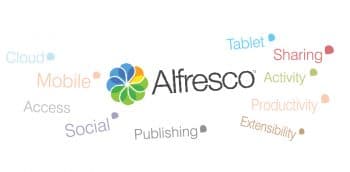Going paperless is generally the primary goal for every organization. This leads to increasing content day by day. This ever evolving content surely needs to have a robust, scalable, easy-to-use, secured and powerful content management system to make it easy to capture, store, manage, preserve and deliver the content on demand. When it comes to Enterprise content management, there are wide range of options available which ranges from proprietary solutions to open source implementations. However, open source and open standard based ECM alternatives seem to be a preferred choice of the organizations in comparison to closed source ECM systems.
Alfresco – a leading open source based ECM – has been available in the market since 2005, helping enterprises maximize the value of their content by providing the content management solutions with open source and open standard based technology stack. Easy to customize, easy to extend and hassle free integration capability with other applications are some of the key features that makes Alfresco a preferred choice as an open source ECM alternative by Business users, Technical architects and Developer groups.
Alfresco is available in 3 different flavours – Alfresco One enterprise edition, Alfresco Community Edition and Alfresco in the Cloud. Alfresco One Enterprise edition is enterprise ready, fully tested edition. It is fully supported by Alfresco and provides additional capabilities such as high availability, analytics and so on. It is ideally suitable for organizations looking for ECM having enterprise level scalability, high availability and full support from the ECM vendor. Alfresco in the cloud is a SaaS based edition of Alfresco One (without additional Alfresco One modules) and ideal for smaller teams which are distributed at multi locations without the hassle to manage the servers on premise. On the other hand, Alfresco Community Edition includes community driven development and contributions. It is developed and maintained by Alfresco with the help of worldwide Alfresco Community members. Alfresco product engineering team periodically does provide fully stable releases of Alfresco Community Edition. Any small to medium businesses can use Alfresco Community Edition in production in non-critical applications considering in mind that it needs to be self-supported with the help of community resources. If this edition caters to your business need then it is the most cost effective solution.
With any of these above mentioned alfresco editions, you will find that alfresco is a complete document management solution for your content needs. Let’s get to know the basic features of Alfresco. Here are 9 key features you must know in order to get most out of your content using Alfresco.
- A perfect collaboration tool
While working in a team, it is essential to collaborate effectively in order to get better productivity. Hence, collaboration tool plays an important role. Out-of-the-box alfresco installation provides a UI interface called Alfresco Share which provides an easy-to-use collaboration platform to effectively collaborate within a team using wiki, blog, calendar and so on. - Workflow capability to simplify business processes
Capturing or creating the content without any approval process may lead to content chaos having unwanted/not useful content added in the repository. Hence, it becomes necessary to validate the content being added to the repository. Alfresco with the integrated workflow engine makes this easily possible and allows to define approval processes to validate the content before making it available for general use. - Secured access to content with robust permission modelling
Content repository may have large number of data residing in it. There may be different types of users such as content creator, content reviewers, internal team members, customers and so on who will be accessing the repository. Not all content can be accessed by everyone. Everyone should be able to access only what they are allowed to access. Hence, providing appropriate permission to content is a must. In alfresco, with the robust permission modelling it is easily possible to provide secure access to the content based on the requirement. - Content on-the-go with effective Search mechanism
In a large sized repository, what if you want to access some specific content based on your requirement? Manually going to each folder to locate the required content is not an option you would be looking for. What if a robust search mechanism is available which will get you the results based on your search criteria? This makes your life a lot easier. Yes, Alfresco does provide searching capabilities based on meta-data of the content and also from the body of the content and allows you to easily find the content you are looking for. - External applications can have hassle free integration with Alfresco
Just in order to understand the capabilities, let’s take a look at some available options. It may possible that you already have a front-end application and you just want to use Alfresco as a backend repository. REST APIs and CMIS makes it easy for other applications to interact with alfresco content repository in a secured way. Also, it is easily possible to configure Alfresco with authentication systems such as LDAP, active directory and so on. Having hassle free integration of external systems with Alfresco is also one of the reason why Alfresco is a preferred choice amongst Technical Architects. - Transformation of content from one format to another
One of the key requirement is to transform content from one form to another. For example, in a contract management system while drafting the contract, contract document in a word format will undergo the review of legal team, finance team and so on in a well-defined workflow process. At the end of the workflow process, the contract becomes active and you want to convert the word document to a non-editable PDF. With content transformation capabilities, it is easily possible in Alfresco. - Versioning capability allows to maintain different versions of content
In a well-defined workflow review process, your content may be reviewed by team of experts and you adhering to their review comments may make modifications to the content. With versioning capability in Alfresco, you can create new versions of the content and easily keep track of every version. - Ability to specify business rules
Business rules help to perform some important action based on some condition. For example, based on the value of some metadata like contract status as review, you want to move the content to Review folder and if contract status is active, move it to the Active folder in order to effectively classify the content. Alfresco allows to easily setup business rules. - Auditing the content
Along with secured access to the content, it is equally important that you know who accessed what. This is simply possible with the auditing capabilities provided in Alfresco.
These are just few basic features of Alfresco to make you familiarise with the capabilities of Alfresco. If you are looking for an open source ECM for your business and are evaluating various alternatives then alfresco is must to be explored. I am sure once you will explore it, you will surely use it because it has wide range of capabilities to serve your ECM needs.











































































